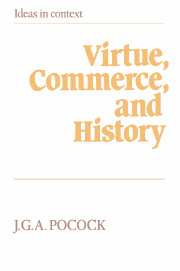 Virtue, Commerce, and History
Virtue, Commerce, and History 4 - 1776: The revolution against Parliament
Published online by Cambridge University Press: 05 May 2010
Summary
We come at last to consider a truly British revolution; one which even involves a revolt against being British. In 1641 and 1688 the kingdom of Great Britain did not exist, and the events in Scotland which preceded one English Revolution in 1637 and followed another in 1689 took place in what was still, though it was ceasing to be, an autonomous political culture; while the unsuccessful last stands of the Old Irish and Old English aristocracies in 1641 and 1689 occurred in an Ireland whose political development had not yet reached the point where so sophisticated a term as “revolution” in its modern sense would be appropriate. John Pym and John Adams may have been revolutionaries; Sir Phelim O'Neill and Swearing Dick Talbot were not. But in the high eighteenth century provincial variants of Whig political culture had established themselves in Lowland Scotland, among the Anglo-Irish, in New England, in Pennsylvania, and in Virginia; there was a kingdom of Great Britain and, briefly, there was an Atlantic British political world – rather vaguely termed an empire – which reached from the North Sea to the headwaters of the Ohio. But within this greater Britain there occurred a revolution which must be thought of as the outcome of its common development, but which resulted in the detachment of its English-speaking sector on the mainland of North America, to become a distinct nation and a highly distinctive political culture.
- Type
- Chapter
- Information
- Virtue, Commerce, and HistoryEssays on Political Thought and History, Chiefly in the Eighteenth Century, pp. 73 - 88Publisher: Cambridge University PressPrint publication year: 1985
- 2
- Cited by
